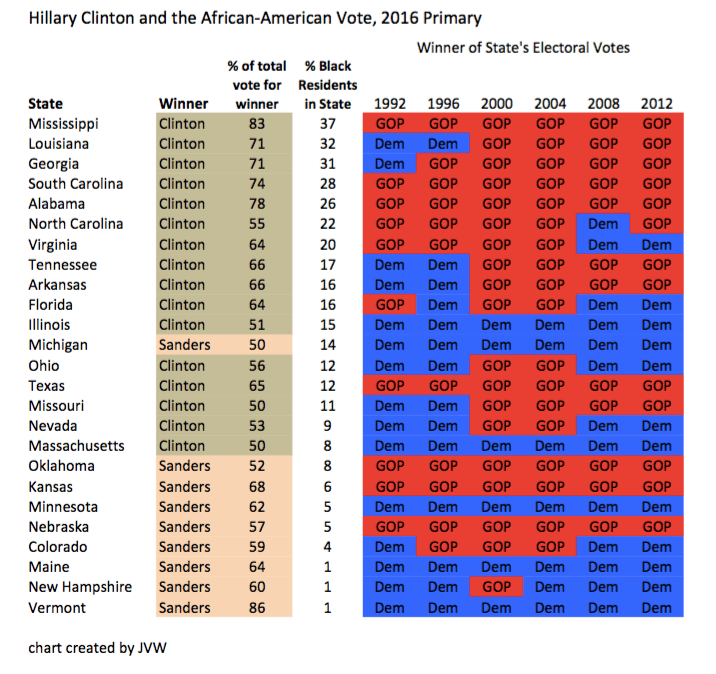Why Hillary! Is Winning And Where It Might Go Bad for Dems
[guest post by JVW]
It appears to be pretty clear after last night’s results that Hillary! Rodham Clinton is now almost a cinch (barring her indictment) to capture the Democrat nomination for President. Her curious loss last week in Michigan’s primary to the socialist Senator Bernard Sanders of Vermont tricked many of us into believing that Clinton could be beaten in the key midwestern states of Illinois, Ohio, and Missouri, but by sweeping those states (albeit narrowly) she has seemingly put to rest any notion that the party’s superdelegates would abandon her and turn this farce from a coronation into a competitive contest.
So in figuring out how an unlikable candidate who is as nails-on-chalkboard grating and as lesbian-performance-art pretentious yet dull as Mrs./Senator/Secretary Clinton could so easily navigate her way to the nomination, I looked into the reported numbers from the Democrat primaries. We all know that Hillary! is generally supported by women and the elderly while Sanders’ appeal is more closely tied to men and the young, but there is one key factor in Hillary!’s win that is impossible to miss:
Hillary! has won sixteen of the seventeen contested states thus far which had the highest concentration of African-American residents, with Sanders’ narrow win in Michigan last week being the one outlier. By contrast, Sanders has won the eight states with the lowest concentration of African-American residents contested thus far. Is it any stretch at all to declare that black voters have made Her Clintonic Majesty the party nominee? (Note: I didn’t include the exit poll numbers for the percentage of the black vote that Hillary! has won in each primary, but she regularly captures between 65-80% of the African-American vote.)
And that leads me to a very interesting opinion piece I read today in — brace yourselves — the New York Times. Tom Edsall is a professor at the Columbia School of Journalism and weekly columnist for the NYT. His wikipedia biography paints a picture of a pretty typical academic/media lefty, but he dares to ask the question of what will become of Democrats if blacks ever get tired of being taken for granted:
Beginning with the administration of Lyndon Baines Johnson, African-American voters have provided Democrats with their margin of victory in elections at every level across the nation, year after year.
How have African-American voters been faring over all? Badly. The Democratic debt to black voters is immense, and the party has not paid up.
He goes on to discuss the theory of “toxic social environments” where children are continually exposed to concentrated poverty and ongoing violence in their neighborhoods, and research which shows that children growing up in these areas disproportionately suffer from social pathologies, even when the family is relatively stable and prosperous. He quotes a sociologist at NYU whose research claims that black children in families with annual incomes of $100,000 per year are more likely to live in a bad neighborhood than white children in families with annual incomes of $30,000 per year, and concludes that “neighborhood poverty alone accounts for a greater portion of the black-white downward mobility gap than the effects of parental education, occupation, labor force participation, and a range of other family characteristics combined.”
After providing more statistics on the effects of toxic neighborhoods and their increase since the first dot.com bubble burst, Edsall turns his attention to the lack of affordable housing in cities in which the political landscape is dominated by liberal Democrats:
Public officials — and the Democratic Party — have, in point of fact, failed to deliver housing, employment or education programs that convincingly remediate the problems of poor black families.
[. . .]
The Democratic Party cannot continue to reap the electoral rewards of the black vote — or embark on a comprehensive revaluation of life at the bottom of the economic scale — without fundamentally reconceiving how it deals with the neighborhoods where many of its voters live.
He also recounts some past campaigns where affluent white liberals have been less than welcoming to lower-income blacks:
Even in super-liberal, very Democratic Amherst, Mass. — Obama 12,316, Romney 1,872 in 2012 — residents fought bitterly against a proposal to build 26 units of moderate income housing. Their decade-long, ultimately futile battle involved “court cases, appeals, and $150,000 worth of legal costs, despite pro bono legal assistance,” The Atlantic reported in June 2015.
In another liberal city, Seattle — Obama 279,000, Romney 46,000 — Mayor Ed Murray announced a major affordable housing initiative on July 13 last year that included a mandatory requirement that all new development include affordable housing.
Then, on July 29, Murray did an about face. “I will no longer pursue changes,” he announced, “that allow more types of housing” in single-family zones. . . .
Edsall compares the potential of frustrated blacks leaving the Democrats to the current free-for-all playing out in the Republican party, and warns Democrats about basking in the GOP’s plight too much while ignoring the stirrings among their own base. The comments to the op-ed appear to be largely from Sanders supporters who criticize African-American Democrats for backing the “corporatist” candidate rather than the authentic wealth redistributor, oblivious to the sad fact that mean old Amherst which is so heavily against moderate income housing went for Sanders over Clinton by a 2:1 ratio in the Massachusetts primary held two weeks ago. With even younger African-American voters apparently preferring Clinton to Sanders, albeit by a far more narrow margin than their elders, could an eventual Hillary! nomination be the last gasp of the multi-racial Democrat coalition that has dominated that party since it was abandoned by working-class whites? Or will younger minorities eventually dismantle the traditional Democrat machine and work to create a more openly left-wing version of the party?
– JVW



